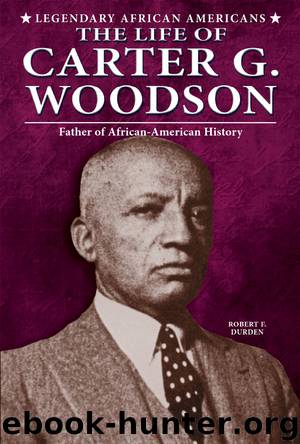The Life of Carter G. Woodson by Robert F. Durden

Author:Robert F. Durden [Durden, Robert F.]
Language: eng
Format: epub
ISBN: 9780766061248
Publisher: Enslow Publishers, Inc.
Published: 2014-03-14T16:00:00+00:00
Chapter 7
AT THE PEAK OF HIS CAREER
By the time Woodson received the NAACP’s Spingarn Medal in 1926, his own scholarly achievements were impressive. He had written or compiled six books. He had authored eight carefully footnoted articles for the Journal of Negro History and reviewed more than ninety books in the same journal. He had also collected and published in the journal a rich assortment of documents relating to black history. All of these achievements were in addition to his having established the Association for the Study of Negro Life and History, the Journal of Negro History, Associated Publishers, and Negro History Week. Woodson’s citation for the Spingarn Medal simply said, “For ten years’ service in collecting and publishing records of the Negro in America. . . . ”1
Amid all of Woodson’s varied activities, he spent a great deal of time traveling around the country giving talks about the association and its work. He spoke to the congregations of African-American churches, to interracial reform organizations sponsored by religious groups, to teachers’ associations, and to the faculty and students of African-American colleges. There were also black fraternal and cultural groups that were glad to hear Woodson speak.
Aside from promoting the study of African-American history, Woodson had to keep trying to raise money. The 1922 grant that he had received from the Laura Spelman Rockefeller Memorial Fund in support of his research and publication program had been for a five-year period. As the fifth year approached, Woodson hoped to persuade the foundation to renew and even increase its support. Thinking big, Woodson asked for three times as much money as his original grant; this time he requested $15,000 a year for five years. Prominent white scholars, at Woodson’s request, wrote letters supporting his proposal. One of them noted, “It is rather difficult to cooperate with him, but his work is credible.”2
Woodson did not get as much money as he asked for from the Laura Spelman Rockefeller Memorial Fund. Yet he still did better than he had done before. The foundation agreed to provide $7,600 a year for research and $5,000 a year for publication for a three-year period.
Still, Woodson’s luck with the rich foundations was beginning to run out. The foundation officials continued to worry about the fact that Woodson tended to run a one-man show. He still refused to associate the Journal of Negro History with an African-American college or university. If Woodson became ill or died, what would happen to the journal and the other activities that he had started? Woodson proved immovable. He argued that “none of the so-called Negro universities has carried out a research program or produced through their professors any work appraised as scientifically valuable.” He conceded that someday the situation might change so that it would be possible to link the journal with an African-American college or university. For the time being, though, he insisted that “there is such little interest in the work [of black history] at any one institution” that it could “be
Download
This site does not store any files on its server. We only index and link to content provided by other sites. Please contact the content providers to delete copyright contents if any and email us, we'll remove relevant links or contents immediately.
Pocahontas by Joseph Bruchac(3734)
Adulting by Kelly Williams Brown(3690)
Unfiltered by Lily Collins(3617)
In the Shadow of Liberty by Kenneth C. Davis(3135)
Earthrise by Edgar Mitchell(2763)
Almost Adulting by Arden Rose(2304)
Charlie and the Chocolate Factory (Puffin Modern Classics) by Roald Dahl(2040)
Fierce by Aly Raisman(1861)
The Audition by Maddie Ziegler(1818)
Borders by unknow(1794)
I Will Always Write Back by Martin Ganda(1771)
Women in Science by Rachel Ignotofsky(1413)
The Day the President Was Shot by Bill O'Reilly(1372)
Amelia Earhart by Doris L. Rich(1344)
The Last Days of Jesus by Bill O'Reilly(1266)
God's Smuggler by Brother Andrew(1224)
Redefining Realness by Janet Mock(1223)
Extraordinary, Ordinary People by Condoleezza Rice(1212)
Popular: Vintage Wisdom for a Modern Geek by Maya Van Wagenen(1156)
